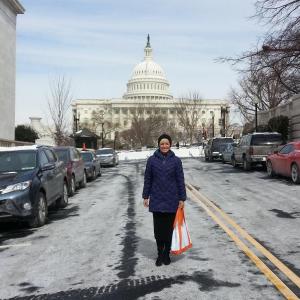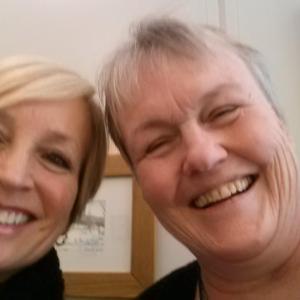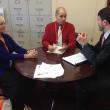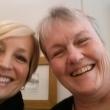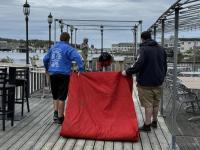One Boothbay woman’s 'March' on Washington
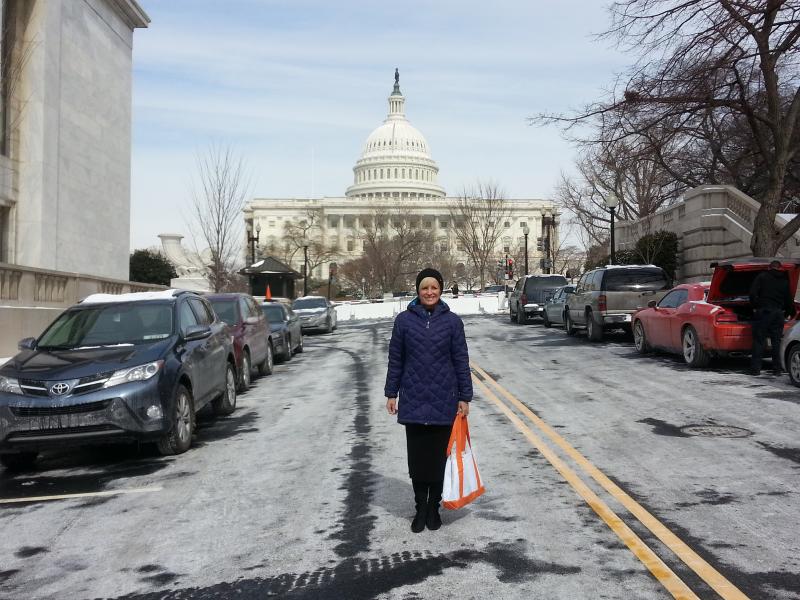 Mrs. Goldhirsch goes to Washington, D.C. Sharon Goldhirsch is pictured in front of the Capitol building in Washington, D.C. Goldhirsch just returned from a summit for patients like her who struggle with kidney disease. Courtesy of Sharon Goldhirsch
Mrs. Goldhirsch goes to Washington, D.C. Sharon Goldhirsch is pictured in front of the Capitol building in Washington, D.C. Goldhirsch just returned from a summit for patients like her who struggle with kidney disease. Courtesy of Sharon Goldhirsch
 Sharon Goldhirsch, left, and Jerry Waterbury of New Orleans work with an aid from Congressman Steve Scalise’s office. Courtesy of Sharon Goldhirsch
Sharon Goldhirsch, left, and Jerry Waterbury of New Orleans work with an aid from Congressman Steve Scalise’s office. Courtesy of Sharon Goldhirsch
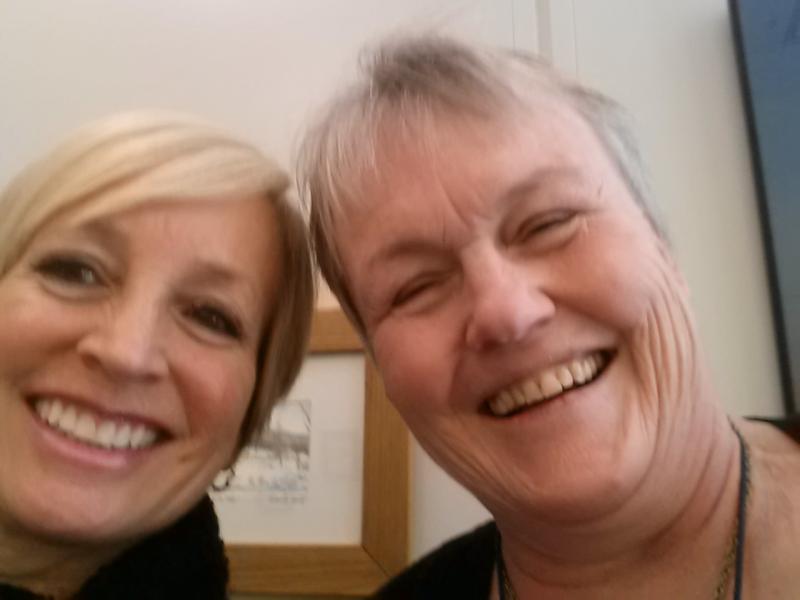 A “selfie” with Sen. Angus King’s Senior Policy Advisor Marge Kilkelly, right, (formerly Marge Brewer of Boothbay). Courtesy of Sharon Goldhirsch
A “selfie” with Sen. Angus King’s Senior Policy Advisor Marge Kilkelly, right, (formerly Marge Brewer of Boothbay). Courtesy of Sharon Goldhirsch
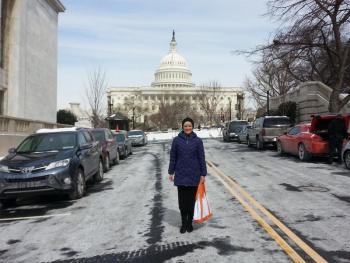 Mrs. Goldhirsch goes to Washington, D.C. Sharon Goldhirsch is pictured in front of the Capitol building in Washington, D.C. Goldhirsch just returned from a summit for patients like her who struggle with kidney disease. Courtesy of Sharon Goldhirsch
Mrs. Goldhirsch goes to Washington, D.C. Sharon Goldhirsch is pictured in front of the Capitol building in Washington, D.C. Goldhirsch just returned from a summit for patients like her who struggle with kidney disease. Courtesy of Sharon Goldhirsch
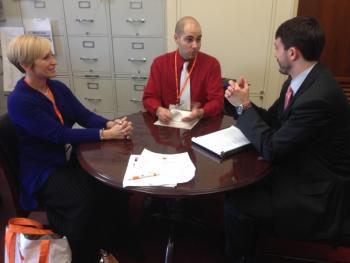 Sharon Goldhirsch, left, and Jerry Waterbury of New Orleans work with an aid from Congressman Steve Scalise’s office. Courtesy of Sharon Goldhirsch
Sharon Goldhirsch, left, and Jerry Waterbury of New Orleans work with an aid from Congressman Steve Scalise’s office. Courtesy of Sharon Goldhirsch
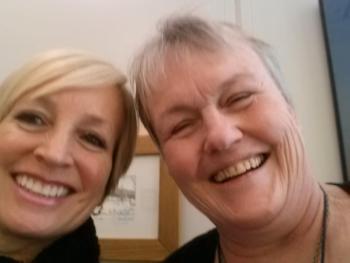 A “selfie” with Sen. Angus King’s Senior Policy Advisor Marge Kilkelly, right, (formerly Marge Brewer of Boothbay). Courtesy of Sharon Goldhirsch
A “selfie” with Sen. Angus King’s Senior Policy Advisor Marge Kilkelly, right, (formerly Marge Brewer of Boothbay). Courtesy of Sharon Goldhirsch
Sharon Goldhirsch said she always preferred a private life. Not many people knew she lived most her life with chronic kidney disease. But last week her life changed.
Goldhirsch, 57, of Boothbay, recently returned home from the 2014 Kidney Patient Summit. She and 70 other kidney disease patients gathered in Washington, D.C. to bring awareness to one of America's most dangerous and underfunded diseases.
“I've had this disease for so long, and I've never really talked about it. Only my closest friends know,” Goldhirsch said. “So this was a big step. It's very much a healing process.”
Goldhirsch is soft spoken and petite. Her condition makes her weak and easily exhausted. But beneath her gentle demeanor there's a strong soul.
Goldhirsch contracted kidney disease as result of rheumatic fever when she was 14 years old. The doctors told her that when she turned 25, her kidneys would likely fail. Although it's been 32 years and her kidneys have held up, which is nothing short of a miracle, she said she wonders every day when the inevitable will happen.
There is no cure for preventing kidney failure, and the early signs of the disease are subtle. Out of 73 million American adults, one in three are at risk for developing kidney disease and 26 million are estimated to already have chronic kidney disease, although most don't even know it yet, according to the National Kidney Foundation.
Medicare covers all kidney disease patients by law, but treatments are expensive.
That's why Goldhirsch decided to set out and make a difference. Goldhirsch said her ultimate goal was to raise awareness with lawmakers, so that new legislation could provide better funding for research, early detection programs and extend Medicare for lifetime coverage of kidney medications. “I think there is hope,” Goldhirsch said.
Goldhirsch sat down with staffers from the offices of U.S. Rep. Chellie Pingree, Sen. Angus King and Sen. Susan Collins. She said even got to spend some time with Marge (Brewer) Kilkelly, formerly of Boothbay, who is now working for King.
“It's like being a lobbyist kind of. You want them to focus on you, and focus on your cure,” Goldhirsch said.
Goldhirsch told her story of battling kidney disease and how insurance companies denied her coverage based on her condition.
When a patient undergoes a kidney transplant, immunosuppressive drugs are needed to keep the immune system from rejecting the new kidney. The immunosuppressive drugs are covered for only three years by Medicare. After that, the treatments come with a hefty price tag of $17,000 per year.
“So after three years you're on your own,” Goldhirsch said. “You're still on Medicare, but they're just not going to cover the drugs. So what happens is people stop taking the drugs and then the body rejects the kidney.”
With yet another failed kidney, the patient must go on dialysis to flush the waste out of their system and maintain healthy blood levels. Routine dialysis runs the patient $80,000 per year. So the patient gets back in line for another kidney, and they get another three years of medication.
As of February 26, there are 99,336 Americans on the waiting list for a kidney transplant.
“It's really frustrating, and for the taxpayer, it's ridiculous; it doesn't make any sense,” Goldhirsch said.
Goldhirsch said members of Congress were very informed and receptive to her proposal. She said her experience in Washington, D.C., was uplifting. She never thought she would be part of the solution that could make such a difference in so many lives.
“What I took away from it is Congress is doing a lot more than we think, you know? If they could just put their politics aside for one minute, there are some amazing people there that can get some amazing things done,” Goldhirsch said.
Although she had initial reservations about being invited to the Capitol, the Kidney Patient Summit was a life changing event for Goldhirsch because she was surrounded by the most friendly people, like her who wanted to help others.
“Sometimes, like any disease, it's easier to ignore it, and pretend like it's not happening. So when you come out and talk about it, it's like it makes it more real,” Goldhirsch said. “It was good that I went.”
As part of spreading the word for Kidney Awareness Month, Goldhirsch urged everybody to go out and get tested for kidney disease. People with diabetes and high blood pressure are most at risk of getting the disease.
Event Date
Address
United States

